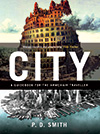Guy Debord: Revolution in the Service of Poetry
Times Literary Supplement, 29 April 2011, p 26
Guy Debord: Revolution in the Service of Poetry, by Vincent Kaufmann, translated by Robert Bononno (University of Minnesota Press), £18.50, 345pp
By PD Smith

Vincent Kaufmann’s stated desire in this book, originally published in French in 2001, is to “clarify the images Debord left behind”. It is a laudable objective for a study of an avant-garde writer and filmmaker whose work investigated the role of representations in society. In this intellectual biography, Kaufmann focuses on Debord’s creative output rather than on the salacious details of his life, such as the womanizing and the drinking (although he does note that there is an “alcoholic style” in Debord’s work). But as Kaufmann says, “the history of his ideas is inseparable from the singular adventure of his life”. The approach is therefore broadly chronological, beginning with his involvement with the lettrists in Paris in the early 1950s, followed by his leading role in the Situationist International and the uprising of 1968, as a result of which Debord was forced to flee Paris, first for Belgium then Florence (which he described as “one of the best cities that ever was”), and concluding with Debord’s footloose yet productive final years, characterized by a fusion of “poetics and politics”.
The book begins with a line from Debord’s first (anti-)film, Hurlements en faveur de Sade (1952; Howls for Sade) that becomes a leitmotif in Kaufmann’s analysis of Debord’s life and work: “Like lost children we live our unfinished lives”. Debord admired the Austrian writer Robert Musil and, for Kaufmann, the French intellectual was very much a man without qualities. Like Ulrich in Der Mann ohne Eigenschaften and those other “lost children”, the lettrists, Debord was haunted by a melancholy sense of the passage of time, his own mortality, and the knowledge that it was “too late to become an adult, to become someone”. The dérive and psychogeography, which emerged from the golden age of the lettrist movement, were attempts to found a science of urban space to counter this sense of Vergänglichkeit, of time’s passing. It was, says Kaufmann, “art reduced to a pure principle of mobility” and Debord himself became “an artist of transition”.
Throughout his life, Debord was a protean figure, constantly reinventing himself and defiantly subverting the images others attempted to foist upon him, particularly that of the great writer, à la Sartre: “he was no one’s student, never followed anyone, and did nothing that would encourage a following of his own”. His seminal study (and later film), Le Société du spectacle (1967; The Society of the Spectacle) is today “one of the leading texts of far-left discourse” but remains an enigma, claims Kaufmann, a book that is as much about Debord as it is a work of theory and analysis. Just as psychogeography sought to uncover the reality of urban spaces, his radical critique of the spectacle was part of Debord’s life-long quest for authenticity and absolute freedom.
Abrasive (one of his books was even bound in sandpaper), playful and always controversial, Debord was a complex and enigmatic figure who admitted that “I have long striven to maintain an obscure and elusive existence.” Kaufmann admires Debord’s “art of defiance, his belligerent and melancholy poetics.” He also finds coherence in Debord’s oeuvre where others find chaos: “the theoretician and autobiographer, the revolutionary and the poet are one and the same”. Kaufmann’s analysis is illuminating and succeeds in unifying the disparate strands of “a life devoted to the repudiation of society’s inquisitorial stare”, revealing a man whose thinking remains both provocative and original.
[N.B. This is a longer version than the review printed in the TLS.]

